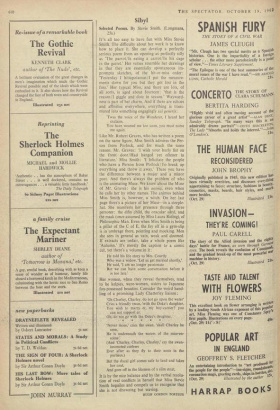Sibyl
IT'S all too easy to have fun with Miss Stevie Smith. The difficulty about her work is to know how to place it. She can develop a perfectly serious poem from an opening as perfectly silly as 'The parrot/Is eating a carrot/In his cage in the garret.' Her verses resemble her drawings in that they are essentially spontaneous im- promptu sketches, of the hit-or-miss order: 'Yesterday I hittapotamus/I put the measure- ments down for you but they got lost in the fuss.' Her typical Miss, and there are lots, of all sorts, is aged about fourteen: 'that is the reason/I giggle and dote in season.' Wayward- ness is part of her charm. And if there are echoes and affinities everywhere, everything is trans- muted into something engagingly sui generis:
'Twas the voice of the Wanderer, I heard her exclaim, You have weaned me too soon, you must nurse me again.
Like Mr. Robert Graves, who has written a poem on the same figure, Miss Smith admires the Per- son from Porlock, and for much the same reason. Mr. Graves: 'I wish your burly fist on the front door/Had banged yet oftener in literature.' Miss Smith: 'I felicitate the people who have a Person from Porlock /To break up everything and throw it away.' There you have the difference between a major and a minor poet. And there's always the problem of who is the animating Muse. We know about the Muse of Mr. Graves: she is his anima, even when he calls her by other names. The animus behind Miss Smith is, however, a witch. On her last page there's a picture of her Muse—in a steeple- hat. She manifests her presence through three personae: the elfin child, the oracular sibyl, and the mask (once assumed by Miss Laura Riding), of Philosophic Man. Even when Miss Smith is being a pillar of the C of E, the fey elf in a gym-slip is in umbrage there, pointing and mocking. Men she sees in general as vain, weak and doomed. If extracts are unfair, take a whole poem like 'Autumn.' It's merely the caption to a comic cut, yet there's a volume in it :
He told his life story to Mrs. Courtly
Who was a widow. 'Let us get married shortly,'. He said, 'I am no longer passionate
But we can have some conversation before it is too late.'
Her women, when they reveal themselves, tend to be kelpies, were-women, sisters to Japanese fox-possessed beauties. Consider the weird hand- ling of a promising Lady Chatterley liaison 'Oh Charley, Charley, do not go upon the water' Cries a friendly swan, 'with the Duke's daughter. You wish to marry er, my boy-carrier? you can not support er.
Oh, do not go with the. Duke's daughter. * * * * * 'Never more,' cries the swan, 'shall Charley be seen, He is underneath the waters of the mise-en- scene.
(And 'Charley, Charley, Charley,' cry the swan- instructed curlews
Ever after as they fly to their nests in the purlieus.) But the ducal girl comes safe to land and takes her coat, And goes off in the likeness of a slim stoat.
It is by the nice balance and by the verbal resolu- tion of real conflicts in herself that Miss Stevie Smith beguiles and compels us to recognise that she is not drowning but waving.
HUGH GORDON PORTEUS














































 Previous page
Previous page